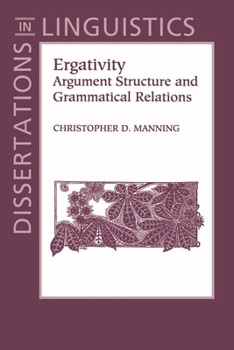Ergativity: Argument Structure and Grammatical Relations
Select Format
Select Condition 
Book Overview
This volume considers and examines some of the phenomena that have led languages to be considered 'ergative'. Languages considered 'ergative' have only been sparsely studied, and many fundamental questions in their analysis seem at best incompletely answered. This volume fills that void by focusing on some of the basic issues: when ergativity should be analysed as syntactic or morphological; whether languages can be divided into two classes of syntactically and morphologically ergative languages, and if so where the division should be drawn; and whether ergative arguments are always core roles or not. Christopher Manning's codification of syntactic approaches to dealing with ergative languages is based on a hypothesis he terms the 'Inverse Grammatical Relations hypothesis'. This hypothesis adopts a framework that decouples prominence at the levels of grammatical relations and argument structure. The result is two notions of subject: grammatical subject and argument structure subject and a uniform analysis of syntactically ergative and Philippine languages. These language groups, the syntactically ergative and Philippine languages, allow an inverse mapping in the prominence of the two highest terms between argument structure and grammatical relations. This volume combines good scholarship with innovative ideas into an important work that will appeal to a wide range of linguists and scholars.
Format:Paperback
Language:English
ISBN:1575860368
ISBN13:9781575860367
Release Date:June 1996
Publisher:Center for the Study of Language and Informat
Length:236 Pages
Weight:0.74 lbs.
Dimensions:0.5" x 6.0" x 9.0"
Related Subjects
Language ArtsCustomer Reviews
0 rating





